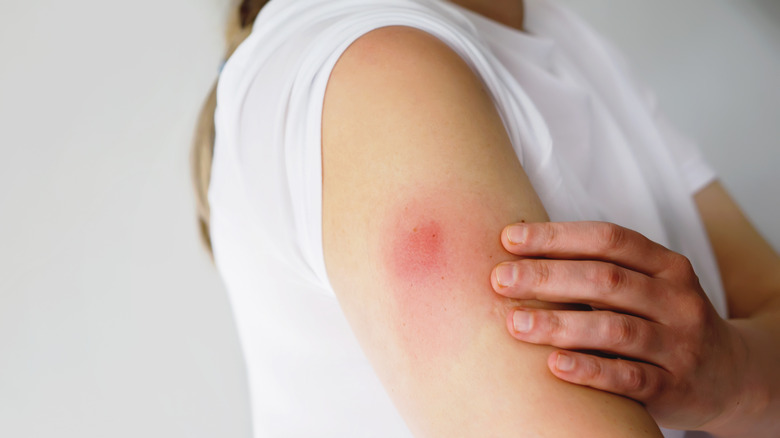What It Means If You Start To Swell After Getting The COVID-19 Vaccine
Some people who have received the COVID-19 vaccine have reported experiencing pain, redness, swelling, and an itchy rash near the injection site. This is sometimes referred to as COVID arm (via Medical News Today). While COVID arm can be unsettling and uncomfortable, it is a relatively common and harmless side effect of the vaccine.
When you get vaccinated, your body develops an immune response by learning to fight off the virus. This elicits an inflammatory response, which may lead to swelling and other symptoms near the injection site.
COVID arm is a delayed skin reaction, which typically develops around eight days after vaccination (via Self). Although it is more common among people who have received the Moderna vaccine, a few people who were given the Pfizer-BioNTech shot have had the same reaction. Fortunately, COVID arm is a mild reaction that normally resolves on its own within a matter of days. While it may be inconvenient and uncomfortable, it should not deter you from getting vaccinated.
When to call your doctor
Although most side effects of the COVID-19 vaccine are mild and typically go away on their own, some people may experience more severe symptoms. Common reactions like fatigue, headaches, and pain and swelling near the injection site are harmless and to be expected. However, more severe side effects like swelling of the lips, eyes, or tongue are signs of an allergic reaction (via Best Life).
While it is rare, it's not impossible to develop an allergic reaction to the COVID-19 vaccine or any other vaccine. Signs of an immediate allergic reaction usually occur within four hours of receiving your first dose of the vaccine and can include hives, swelling, redness, itchiness, and wheezing or respiratory distress. Allergic reactions can be life-threatening and may require emergency care. If you develop any of these symptoms, you should call your doctor immediately and you should not receive a second dose of the vaccine. In more severe cases, you may need to go to the emergency room.


